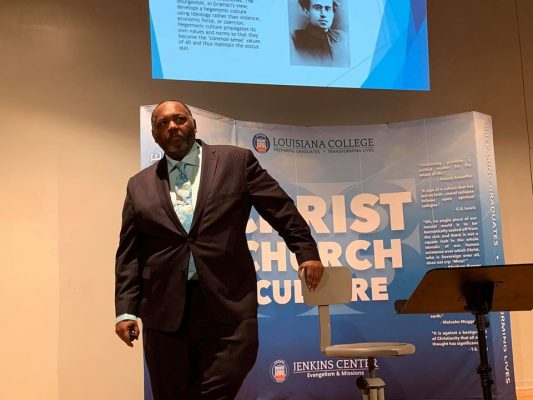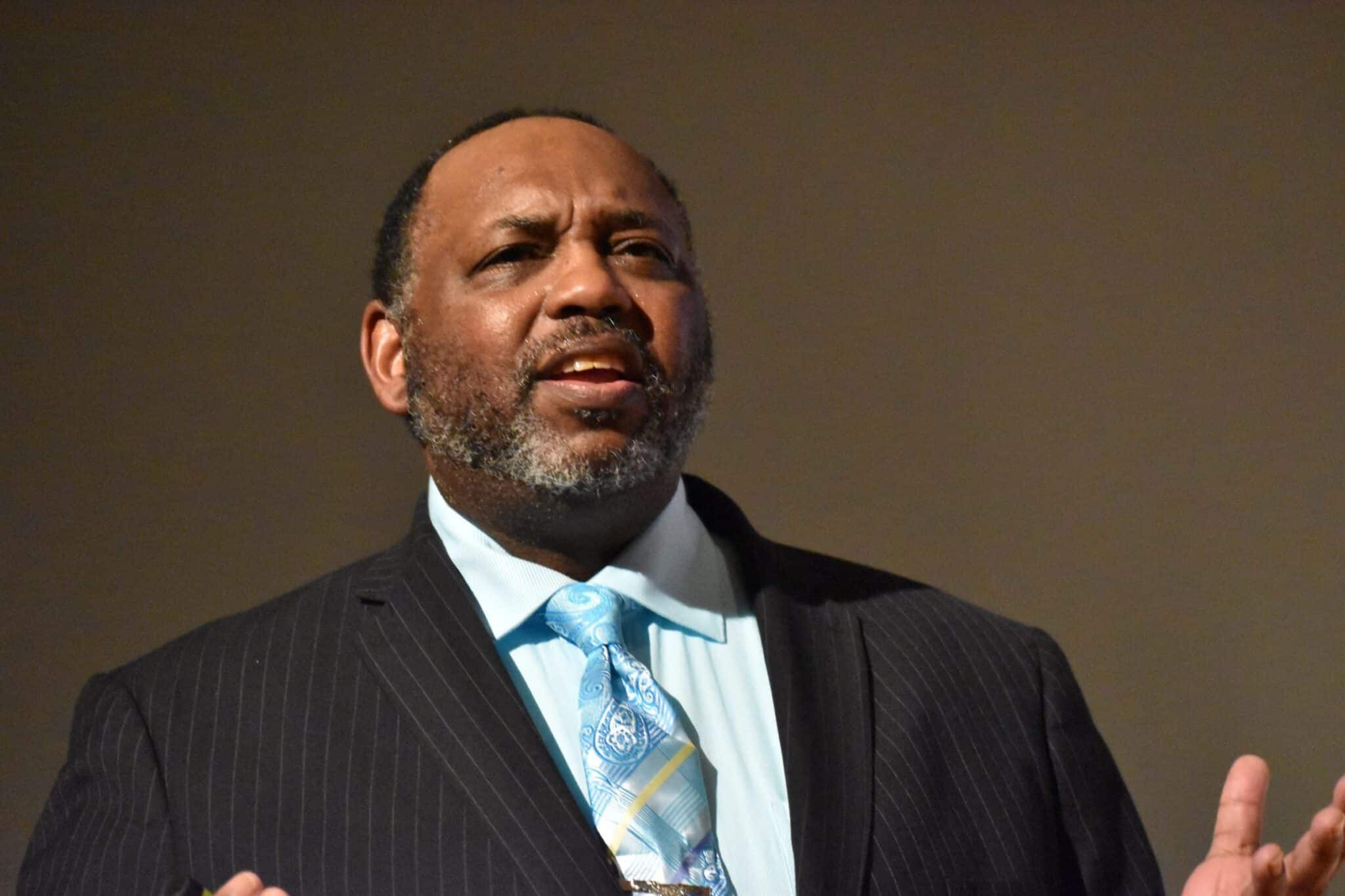By Will Hall, Message Executive Editor
CORRECTION:
Kevin Jones of Southern Seminary is the co-editor of “Removing the stain of racism in the SBC,” with Jarvis Williams, also of SBTS.
In the original version of this article, Kevin Smith was wrongly identified with this book. I apologize to Dr. Smith for the error and for any negative impacts resulting from this misidentification.
— Will Hall, Ph.D., Executive Editor
PINEVILLE, La. (LBM) — Speaking to Louisiana College students as part of a “Christ, Church, and Culture” series about current cultural issues from a biblical perspective, a national speaker on ethics explained the controversial concepts of Critical Race Theory and Intersectionality, and expressed worries that these Marxist ideologies have gained footholds among the faculty of the Southern Baptist Theological Seminary in Louisville, Kentucky, and the Southeastern Baptist Theological Seminary in Wake Forest, North Carolina.
Craig Mitchell, president of the Ethics and Political Economy Center, an evangelical think tank based in Dallas, Texas, described Critical Race Theory and Intersectionality as emerging from Marxist thought, which as its primary tenet declares that there is no God. He added that these two concepts also developed within the framework of different branches of thought that inform the Social Justice movement. But, ultimately, both of these concepts present a perspective that there is conflict between “an oppressor” and “an oppressed” and that the oppressor cannot know right or morality.
Consequently, Critical Race Theory perpetuates the notion that white people cannot know right and cannot be moral. Likewise, Intersectionality, which was shaped fundamentally by black feminist lesbians, declares that a man cannot know truth or the moral thing to do.
“Is there injustice in society,” Mitchell rhetorically asked.
“There is,” he said, “because we live in a sinful, fallen world, and the best that this world has to offer is still pretty messed up.
“If you’re looking for perfect justice — if you’re looking for perfect righteousness — you’re not going to find it until Christ comes again,” Mitchell declared. “When you look at Revelation 20, Jesus Christ comes down and reigns in Jerusalem for a thousand years – a thousand years of perfect justice, a thousand years of righteousness. Then, you know what happens? People rebel.”
Mitchell said justice and righteousness cannot be obtained through either “big” or “little” government. Instead, both will be restored by Jesus Christ “not right now, but in His timing.”
“The best thing you can do is share the Gospel of Jesus Christ with this fallen world,” Mitchell offered. “To the degree that you share the Gospel with others and they come to Christ, and they strive for justice and righteousness, we will have a more righteous society. Not perfect. But don’t think you can do it through politics. Don’t think you can do it through economics.”
After his presentation, students asked questions, including a number about the controversial Resolution 9 passed by messengers at the 2019 Southern Baptist Convention Annual Meeting, and, about the presence of Critical Race Theory and Intersectionality on SBC seminary campuses.
Responding to the description in the resolution calling Critical Race Theory and Intersectionality “useful analytical tools,” Mitchell said this is true only “if you’re a Marxist.” He added that “There’s nobody I know at Southwestern who’s actually teaching Critical Race Theory and nobody who’s actually teaching Intersectionality.”

Ethicist Craig Mitchell was the keynote speaker at Louisiana College’s recent C3 Series. Brian Blackwell photo
He likewise vouched for New Orleans Baptist Theological Seminary.
“I know a bunch of people at New Orleans, and I don’t know of anyone who’s actually teaching that,” Mitchell said. “I’ve known Jamie [Dew, NOBTS president] for years. I don’t think Jamie would go for that. But then I never imagined that Danny Akin [SEBTS president] or Al Mohler [SBTS president] would support this type of thing.”
Mitchell explained that these Marxist ideas are being cultivated on the campuses of SEBTS and SBTS.
“Walter Strickland teaches Critical Race Theory, and you look at black theology and some of the things he has said. Frankly, I am surprised he is still on the [Southeastern] faculty,” Mitchell remarked. “From Southern Baptist Theological Seminary, Louisville, Kentucky, you have Curtis Woods [chairman of the 2019 SBC Resolutions Committee] and you have Jarvis Williams. Jarvis Williams is a New Testament professor. From all accounts Jarvis in his courses doesn’t really teach New Testament, he just teaches Critical Race Theory.
“You have Kevin Jones,” he added. “Kevin is also at Southern.
“When I was still teaching at Criswell College, Kevin ended up being editor of this book called ‘Removing the stain of racism in the SBC,'” he explained. “I got an article they asked me to write on ethics about the state of racism in the SBC. What I did not realize was that some of the writers would have some of the views that they had.
“Southern and Southeastern — those are places where it’s most problematic.”
Closing out the question and answer time, Mitchell told the students, faculty and visitors that the only thing Critical Race Theory and Intersectionality produce is “a Marxist direction.”
“In Resolution 9 they said that Critical Race Theory is a ‘useful analytical tool,’” he said. “It is not a useful tool to get people saved – I can tell you that.”
Messengers at the 2019 Tennessee Baptist Convention Annual Meeting passed a resolution against Critical Race Theory and Intersectionality as a response to the SBC resolution. Additionally, pastors in Georgia and Louisiana have indicated they are going to push during the 2020 SBC Annual Meeting in Orlando, Florida, June 9-10, for a retraction of Resolution 9 or to pass a replacement resolution that condemns the two controversial Marxist theories.
Audio of C3 Series presentation:
Transcript of presentation:





